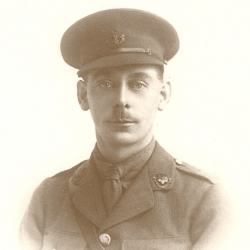John (Jack) Alfred Dearden was born in Douglas, Isle of Man on February 17, 1881 and educated at King William’s College. His father, John Alfred Dearden was a surgeon and in 1901 he was living in Douglas, Isle of Man with his parents (mother, Mary Selina Beckwith Dickson) and three younger sisters (Cecil Maud Dearden, Violet Selina Dearden and Mary Dorothea Dearden) and two domestic servants. At this time, Jack was serving as a Lieutenant in the Militia in the 6th battalion Liverpool Regiment. He went on to serve in the Boer War from January to may 1902 and was awarded the Queen’s South Africa Medal.
He was awarded a commission in the Regular Army with the Manchester Regiment as a Second Lieutenant on January 28, 1903 and promoted to Lieutenant on February 2, 1907. On March 12, 1912 he was made adjutant of the 9th Battalion Manchester Regiment and granted the temporary rank of Captain in the Territorial Force whilst holding the appointment of Adjutant.
He served with the Battalion in Egypt where he was promoted to Captain on December 1, 1914. He landed with the Battalion at Gallipoli on May 9, 1915, but was invalided to hospital in Malta shortly thereafter, leaving the Battalion on June 7th. He left Valletta on HMT City of Benares on July 4th arriving in the UK (Devonport) on July 13, 1915. Here he was diagnosed with Neurasthenia (an ill-defined medical condition characterized by lassitude, fatigue, headache, and irritability, associated chiefly with emotional disturbance) and prescribed 3 months leave.
Throughout 1916 he was regularly medically assessed and repeatedly classified as unfit for General Service but was given light duty office work at the War Office. Finally, in December 1916 he was pronounced fit for General Service but not suitably fit to be posted to sunnier climates, such as those of Egypt or India. Since the 9th Battalion were still in Egypt at this time, guarding the Suez Canal, he continued his war service in the UK where he remained until the end of the war. During this time, on May 19, 1917, he was promoted to Major.
After the war, in September 1919, he was transferred to the 1st Battalion Manchester Regiment, as Staff Captain, for the purposes of being definitively assessed for his fitness to continue to serve. He somehow passed this assessment and served with the Manchester Regiment in Ireland when they deployed there in April 1920. This was the time of the Irish war of independence and on January 28, 1921 the 1st Battalion Manchester Regiment was involved in the Dripsey Ambush. There is no evidence to suggest a connection but on February 17, 1921 Major John Alfred Dearden was the defendant in a Field General Court Martial under section 40 (acting to the prejudice of good order and military discipline) and was “severely reprimanded” and encouraged (forced) to resign his commission which he officially did on July 2, 1921. Nevertheless, he was permitted to join the Regular Army Reserve of Officers upon retirement and was paid an Army pension of £258/year.
Throughout his retirement he evidently had no other source of income as he repeatedly petitioned the Army to commute his pension for small amounts of cash. In 1926, due to his age, he was moved to R.A.R.O. Class 2 status (in the event of mobilization, or partial mobilization, you will take no action but should your services be required you will receive instruction from the War Office).
Major John Alfred Dearden died in his bed on July 26, 1928 in Hertfordshire. He was 47 years old.

